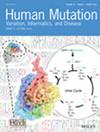Treatability of the KMT2-Associated Neurodevelopmental Disorders Using Antisense Oligonucleotide-Based Treatments
Abstract
Neurodevelopmental disorders (NDDs) of genetic origin are a group of early-onset neurological diseases with highly heterogeneous etiology and a symptomatic spectrum that includes intellectual disability, autism spectrum disorder, and learning and language disorders. One group of rare NDDs is associated with dysregulation of the KMT2 protein family. Members of this family share a common methyl transferase function and are involved in the etiology of rare haploinsufficiency disorders. For each of the KMT2 genes, at least one distinct disorder has been reported, yet clinical manifestations often overlap for multiple of these individually very rare disorders. Clinical care is currently focused on the management of symptoms with no targeted treatments available, illustrating a high unmet medical need and the urgency of developing disease-modifying therapeutic strategies. Antisense oligonucleotides (ASOs) are one option to treat some of these rare genetic disorders. ASOs are RNA-based treatments that can be employed to modulate gene expression through various mechanisms. In this work, we discuss the phenotypic features across the KMT2-associated NDDs and which ASO approaches are most suited for the treatment of each associated disorder. We hereby address variant-specific strategies as well as options applicable to larger groups of patients.


 求助内容:
求助内容: 应助结果提醒方式:
应助结果提醒方式:


